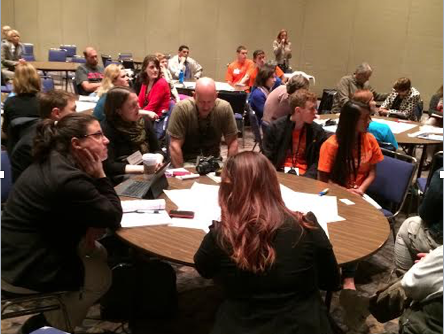Keep America Beautiful, the nation’s leading nonprofit that envisions a country where every community is a clean, green, and beautiful place to live, coordinated the fourth “Zero-Waste Solutions Summit” as part of the 2015 Green Schools National Conference. The event, which took place at the Virginia Beach Convention Center on March 5, 2015, was titled “Trash Talk… Leveraging the science, economics, and policies to create zero waste schools.”
Keep America Beautiful offered knowledgeable guest speakers, breakout groups, and audience participation to help participants get closer to finding, implementing, and sustaining zero-waste initiatives in school systems. The summit brought together members from the private and public sectors to discuss issues such as:
- Barriers to increasing recycling and reducing waste in schools;
- Programs already in place that can be shared/scaled; and
- Engaging students and integrating with curriculum.
“The goal of the Zero-Waste Solutions Summit was to identify barriers schools face to reach their zero-waste goal and then discuss possible solutions,” said Cecile Carson, Senior Director, Affiliate Development, of Keep America Beautiful. Carson continued, “Our ability to gather members from different backgrounds and have open discussions made the event highly productive.”

Photo courtesy of Cecile Carson, Keep America Beautiful
One significant barrier to increasing recycling and reducing waste in schools identified by Quaren Jacklich, a parent volunteer from a Norfolk-based elementary school, is the lack of school resources and staffing. Jacklich believes a lack of adequate staff (or adequate staff time) and funding for proper equipment pose threats, but with proper communication more faculty can become champions for zero-waste initiatives. To engage students and produce tangible results, Jacklich thinks a school must “solicit support from numerous groups such as administration, staff, parents, and the local recycling company and then have these groups work together for the greater good of the school.” Communication and reinforcement for the staff helped W.H. Taylor Elementary School educate the students on proper ways to reduce and recycle, which led to the diversion of roughly 500 pounds of trash from classrooms alone each month.
Lisa Lee Sang from Prince George’s County Public Schools added, “Sometimes we face similar issues with infrastructure and facility management.” Custodial support can be difficult to obtain, so encouraging zero-waste through education, building the duties of recycling into the custodial staffs’ job description, and allowing them time to take on additional tasks are crucial.
The professional development of educators and its barriers were another topic of discussion during the Summit. The manner in which success or impact of zero-waste programs are measured needs to be changed, according to Summit participants. Current models ask for the number of professional development hours attended, the costs associated with training, and number of students taught as benchmarks. Instead, educators should begin to look at the successful implementation of professional development concepts, cost per impact per student, and the number of students reaching predetermined “impact successes,” respectively. This paradigm shift will help change the focus of administrators from static numbers to the actual effect the professional development is having on the school.
The Zero-Waste Solutions Summit also featured Jimmy Nguyen of the United States Department of Agriculture’s Food Waste Challenge Team. Nguyen stressed food waste as a major issue in the United States stating, “Thirty-one percent or 133 billion pounds of food from U.S. retail food stores, restaurants, and homes go uneaten.” Food waste is certainly an issue at landfills, especially when one considers the massive amount of resources used to produce this waste (e.g., land, labor, water, pesticides, and fertilizers). “A waste audit or a reasonably accurate estimate of what and how much is in the waste that is not getting recycled,” should be considered, said John Deuel, president of Greenquest LLC, a recycling and waste reduction consulting firm and national trainer for Keep America Beautiful.
Overcoming these barriers within schools can be difficult, but is not impossible. One suggestion offered was reducing food waste with improved ordering, prepping, and storage of goods. Recovering uneaten food and donating it to those in need, and recycling discarded food for compost, animal feed, and energy generation were additional solutions.
Implementing and sustaining zero-waste initiatives requires a prolonged commitment across all faculty and staff within a school. To learn more about what was discussed at the 2015 Zero Waste Solutions Summit, please visit www.GreenSchoolsNationalNetwork.org or email Tommy Morales of Keep America Beautiful at tmorales@kab.org.
About Tommy Morales:
Tommy Morales joined Keep America Beautiful in 2015 as Program Manager, Education & Litter. He is responsible for growing youth engagement and participation in Keep America Beautiful’s educational programs. Tommy graduated with a BBA in Marketing from Temple University in 2013.
